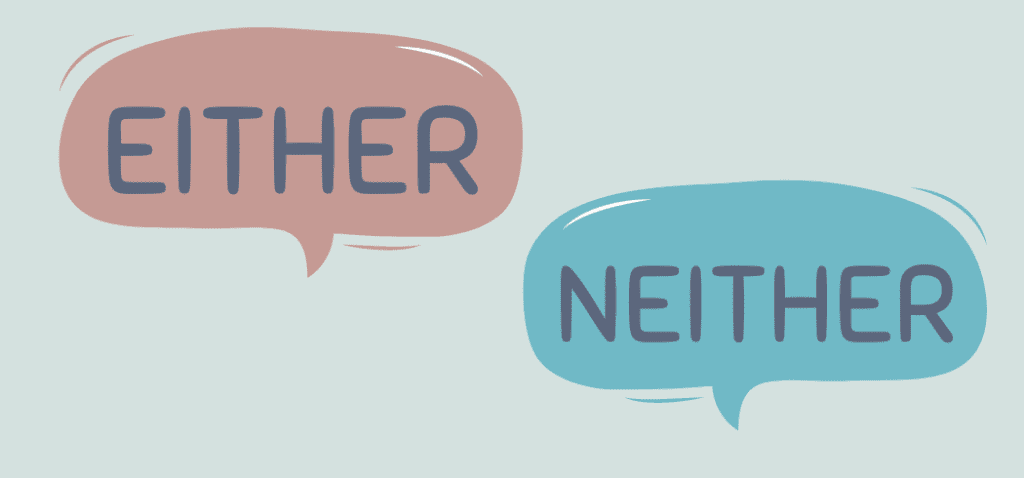Neither and either are two words in the English language that will put your language skills to the test. Not only can their definition and use be challenging to native English speakers, but they can also be challenging for anyone trying to learn the language.
Our guide below defines each and provides tips and tricks to remember which to use and when.
What’s the Difference Between Neither and Either?
Both either and neither are used in sentences to mean “one or the other,” but their connotative use is very different from one another.
Neither is a negative connotation and, when used correctly, technically means the opposite of either. Either is used to indicate a choice between one or another item or in addition to something else.
How to Pronounce Either and Neither
Both words can be pronounced differently depending on whether you prefer the American or British pronunciation.
In American English, either is pronounced with a long “e” sound, as in ee-ther. This is the preferred and most common pronunciation. In British English, it is pronounced with a long “i” sound, as in I-ther.
The same is true with the pronunciation of neither. In American English, the common use involves the long “e” sound, as in nee-ther. The long “i” sound, nI-ther, is preferred in British English.
When to Use Neither or Either

Either may be used as an adverb, a pronoun, a determiner, or conjunction. Neither may be used as a pronoun, a determiner, or conjunction.
Adverb
When either is used as an adverb, it works to replace the connotation “in addition to” and always conveys a link with a preceding negative statement.
For example:
- The vacation was amazing, and it wasn’t expensive either
- You don’t like apples; I don’t either.
Pronoun
Either used as a pronoun means “one or the other,” and neither means “not either” or “not one or the other.”
For example:
- The dress didn’t flatter either of them.
- Neither dress was flattering to them.
Determiner
A determiner is a word that conveys the importance of a noun in a sentence. When either is used as a determiner, it means “one or the other of two things or people.” Neither means “not either thing or people.
For example:
- Either candidate will do the job that is expected of them.
- Neither candidate is qualified to do what is expected of them.
Conjunction
As a conjunction, either is always used with or to indicate a choice can be made between a pair of choices or multiple people or things. It can also suggest that there is more than one possibility or comparison. Neither is used with nor to indicate something is not true about two or more things, actions, people, etc.
For example:
- I would prefer to attend either the ballet or the opera tomorrow evening.
- I am neither interested in ballet nor opera as a form of entertainment.
Do You Say Me Neither or Me Either?
It’s common to agree with a person’s statement by replying, “me either.” Or is it “me neither”? Both agree with the statement being made, but which expression is correct?
The answer is neither. Me neither and me either are not grammatically precise meanings but are accepted for everyday use. Although we discourage their use since there are many other ways to express agreement, me either is the better choice verbally.
This is because me either provides a more inclusive use for a broader range of statements. Me neither indicates a negative use and is more exclusive in what it is used with. Me either hints at the more extended expression: I also don’t think that, or I don’t think so, either.
For example:
Statement: I really don’t like how this school year started out
Reply: Me either
Neither vs. Either: Tips to Remember Which to Use
If you are struggling to remember when to use which word, we have a simple trick for you to use. Neither provides an exclusively negative use. Both the word neither and the word negative start with an ‘n’ and can help you remember how it is used compared to either.
How to Use Either and Neither In a Sentence
Hunkered in below, at a base camp called Trinity Site, [they worked]. to make sure both great powers had the bomb so neither of them could use it.” [Albuquerque Journal]
Winners and losers — Red Sox not among either — in winter free agency. [Boston Globe]
When Mrinal Kalakrishnan and Preeti Talwai first met at work, neither of them was looking for romance. [New York Times]
As a general rule, when your flight is scrapped, you are entitled to either a refund or travel credit. [News 7]
The couple is behind bars in the Cleveland County Detention center. Court records show so far, neither has an attorney. [News 9]
Let’s Review
Either and neither mean one or the other, but neither has a negative connotation. The use of either indicates a choice between two or more items. Neither also suggests a choice, but in a manner that emphasizes that neither option is acceptable.
